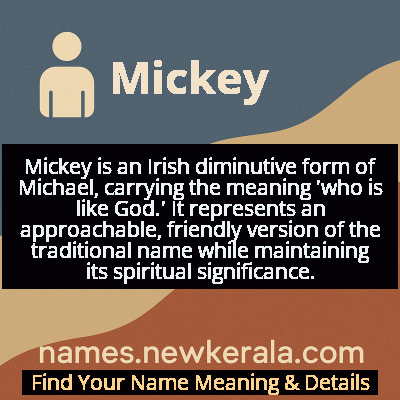Mickey Name Meaning & Details
Origin, Popularity, Numerology Analysis & Name Meaning of Mickey
Discover the origin, meaning, and cultural significance of the name MICKEY. Delve into its historical roots and explore the lasting impact it has had on communities and traditions.
Name
Mickey
Gender
Male
Origin
Irish
Lucky Number
3
Meaning of the Name - Mickey
Mickey is an Irish diminutive form of Michael, carrying the meaning 'who is like God.' It represents an approachable, friendly version of the traditional name while maintaining its spiritual significance.
Mickey - Complete Numerology Analysis
Your Numerology Number
Based on Pythagorean Numerology System
Ruling Planet
Jupiter
Positive Nature
Optimistic, inspirational, and creative.
Negative Traits
Scattered, exaggerating.
Lucky Colours
Yellow, gold, purple.
Lucky Days
Thursday.
Lucky Stones
Yellow sapphire.
Harmony Numbers
1, 2, 9.
Best Suited Professions
Arts, writing, communication.
What People Like About You
Creativity, optimism.
Famous People Named Mickey
Mickey Mantle
Baseball Player
New York Yankees legend and Baseball Hall of Fame inductee
Mickey Rooney
Actor
Academy Award nominee with career spanning nine decades
Mickey Gilley
Country Singer
Country music star with 17 number one Billboard hits
Mickey Spillane
Author
Best-selling crime novelist, creator of Mike Hammer
Name Variations & International Equivalents
Click on blue names to explore their detailed meanings. Gray names with will be available soon.
Cultural & Historical Significance
The name's journey from Irish religious tradition to American pop culture icon represents the broader story of Irish assimilation and cultural influence. Mickey serves as a bridge between the sacred and secular, the traditional and modern. In contemporary Ireland, it remains a popular nickname that honors both family tradition and national identity, while internationally it's recognized through its Disney association. This dual identity makes Mickey uniquely positioned in global naming culture, representing both specific ethnic heritage and universal pop culture recognition.
Extended Personality Analysis
People named Mickey are typically perceived as approachable, charismatic individuals with natural social skills. The diminutive nature of the name suggests someone who is friendly, personable, and easy to connect with on a personal level. They often possess a youthful energy and enthusiasm that makes them engaging companions, regardless of their actual age. Many Mickeys display a creative streak and adaptability that allows them to excel in dynamic environments. Their personality often blends the reliability and strength associated with the formal name Michael with the spontaneity and charm of the informal diminutive.
This combination of traits frequently makes Mickeys natural leaders who can inspire others through both their competence and their approachability. They tend to be resilient individuals who can navigate challenges with both determination and good humor. The name's Irish origins often translate into a strong sense of community and family loyalty, while its pop culture associations contribute to a modern, innovative outlook. Mickeys typically balance traditional values with contemporary perspectives, making them effective in both conventional and creative pursuits. Their ability to maintain core principles while adapting to new situations makes them valuable in diverse social and professional contexts.
Modern Usage & Popularity
In contemporary naming practices, Mickey maintains a distinctive position as both a formal name and affectionate nickname. While its usage as a legal first name has declined somewhat from its mid-20th century peak, it remains popular as a diminutive for Michael, particularly in Irish and Irish-American communities. The name's strong association with Disney's Mickey Mouse creates a unique dynamic where parents may hesitate to use it formally due to the prominent pop culture connection, yet continue to embrace it as a nickname. Recent naming trends show Mickey appearing more frequently as a middle name, allowing families to honor the tradition without the immediate Disney association. In Ireland specifically, it maintains stronger formal usage, preserving its cultural roots while adapting to modern naming preferences that favor traditional Irish names with global recognition.
Symbolic & Spiritual Meanings
Symbolically, Mickey represents the harmonious blending of tradition and innovation, sacred origins and secular adaptation. As a diminutive of Michael, which means 'who is like God,' it carries profound spiritual symbolism of divine protection and moral strength, while its informal nature symbolizes approachability and human connection. The name embodies the Irish cultural tradition of creating intimate, personal forms that maintain respect for formal traditions while fostering closeness and familiarity. Mickey also symbolizes the transformative power of popular culture, demonstrating how a traditional name can acquire entirely new layers of meaning through media and entertainment. This dual symbolism makes it representative of cultural adaptation and the ongoing evolution of identity in a globalized world, where heritage and modernity coexist and enrich each other.

